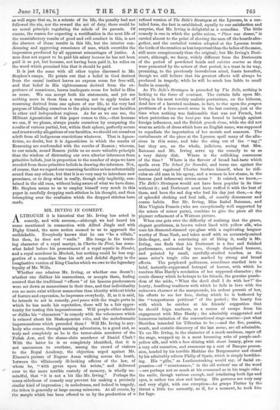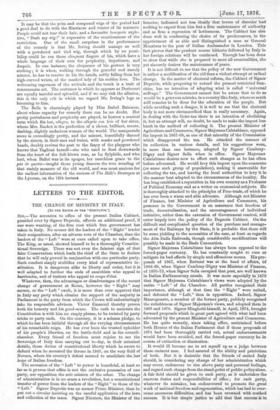MR. IRVING IN COMEDY. ALTHOUGH it is historical that Mr. Irving
has acted in comedy, and with success,—although we had heard his name mentioned in connection with Alfred Jingle and with Digby Grand, the mere notion seemed to us to approach the unthinkable. Everybody knows that he can "be a villain," but then, he does not " smile." His image in the touch- ing character of a royal martyr, in Charles the First, has some- -what faded before his presentment of a royal mystic in Hamlet, and a royal murderer in Macbeth, but nothing could be less sug- gestive of a comedian than his soft and doleful dignity in the imaginative version of King Charles which we owe to the legendary loyalty of Mr. Wills.
Whether one admires Mr. Irving, or whether one doesn't ; whether one dislikes his mannerisms, or accepts them, feeling assured that the traditional " effects " of his famous predecessors were set down as mannerisms in their time, and that individuality can no more exist without mannerism than identity without tricks of feature and expression, he impresses everybody. If, as it is said, be intends to act in comedy, pari passu with the tragic parts in which he has made his reputation, there will be a fair oppor- tunity for testing this impressiveness. Will people either admire or dislike his " characters " in comedy with the vehemence which is evinced about his Shakespearian roles, and the melodramatic impersonations which preceded them? Will Mr. Irving be any- body who comes, through amusing adventures, to a good end, so truly and completely as he is the terror-slain murderer of the 'Polish Jew, and the shame-slain murderer of Daniel Clark? With the latter he is so completely identified, that it is not uncommon to overhear, among the crowd of visitors to the Royal Academy, the objection urged against Mr. Elmore's picture of Eugene Aram walking across the heath, 'between the villainously ill-looking officers of the law, of whom he, " with gyves upon his wrists," and delivered over to the more terrible custody of memory, is wholly un- mindful, that "it is not a bit like Mr. Irving." Perhaps the -many-sidedness of comedy may prevent his making a precisely similar kind of impression ; in melodrama, and indeed in tragedy, the triton is generally at large among minnows. At all events, by the sample which has been offered to us by the production of a refined version of The Belle's Stratagem at the Lyceum, in a cur- tailed form, the fact is established, equally to our satisfaction and surprise, that Mr. Irving is delightful as a comedian. The little comedy is one in which the polite axiom, " Place our dames," is carried almost to the point of shoving the men off the boards alto- gether, and the curtailed version adopted at the Lyceum treats the lords of the creation as less important than the ladies of the same, still more conspicuously than the original ; but Mr. Irving's Dori- court, although, we fancy, widely different from the Doricourta of the period of powdered heads and culottes courtes as they were presented by the actors of that period, is a treat in its way, promising, to the previously incredulous mind, feasts hereafter, though we still believe that his greatest effects will always be produced in tragedy, while he will be much leas liable to small faults in comedy.
As The Belle's Stratagem is preceded by The Bells, nothing is lacking to the force of contrast. The curtain falls upon Mr. Irving in his most terribly realistic portraiture, on the hideous, dead face of a haunted madman, in fact, to rise upon the pompon prettiness of a beau-monde scene in the last century, just at the time when nothing was fashionable that was not French, but when patriotism on the haul pas was bound to inveigh against foreign influences, and the British grande dame, while she did not wear an article of dress which bore an English name, was supposed to repudiate the importation of her morals and manners. The curtailments of the piece at the Lyceum spoil many of the allu- sions in this sense, and take the sting out of the " tag but they are, on the whole, judicious, seeing that Mrs. Bateman and Mr. Irving serve up the comedy to us as
a very dainty dish. Where is the rollicking coarseness of the time ? Where is the flavour of broad bad-taste which spoils even The School for Scandal, and turns one against the sentimental vagabond Charles Surface himself, when he ridi- cules an old man in his agony, and a woman in her shame, in the famous (and infamous) screen-scene ? It existed, we know,— The Belle's Stratagem would not have been popular in its time without it ; and Doricourt must have ruffled it with the best of them, and been the sad dog who had his day just then,—a day of splendid clothing and foul talk, of courtly demeanour and coarse habits. But Mr. Irving, Miss Isabel Bateman, and Miss Virginia Francis (who are exceptionally well supported by the actors of minor parts), combine to give the piece all the piquant refinement of a Watteau picture.
When one gets over the difficulty of realising that the grave, elegant gentleman, in brown velvet lined with yellow silk, who uses his diamond-rimmed eye-glass with a captivating languor worthy of Beau Nash, and takes snuff with an accurately-raised little-finger, and a convincing air of liking it, really is Mr. Irving, one finds that his Doricourt is a fine and finished performance, animated by true, though disciplined humour, and pointed by small, carefully-studied touches, as the same actor's tragic roles are marked by strong and broad effects. The perplexed politeness, sometimes startled into a brief, instantly-suppressed betrayal of horror, with which he receives Miss Hardy's revelation of her supposed character ; the comic dismay which he betrays to his friends, the genuine puzzle- dom of the aside, " What the devil shall I do with her?" the hearty, headlong readiness with which he falls in love with the unknown charmer at the masquerade, his ardent pursuit of her, his efforts to see her face, during which he is bothered by the "tempestuous petticoat" of the period ; the hearty fun with which he catches at his friends' suggestion that he should feign madness, as a means of escape from his engagement with Miss Hardy ; the admirably exaggerated and humorous imitation of the conventional stage-maniac--just what Sheridan intended his Tilburina to be ;—and the fire, passion, wrath, and ecstatic discovery of the last scene, arc all admirable. To see Mr. Irving, in the character of a mock-madman, caper off the stage, wrapped up in a most becoming robe of purple-and- yellow silk, and with a face shining with sheer lunacy, gives one a very odd sensation, and summons up a sort of Banquo proces- sion, headed by his terrible Mathias the Burgomaster and closed by his admirably odious Philip of Spain, which is simply bewilder- ing. His "gifts," as Leatherstocking would say, of facial ex- pression—of " countenance," in the old writers' use of the word —are perhaps not so much at his command as in his tragic roles; the smile, though various enough, and irradiating both lips and eyes, is rather too slow and lasting. His gestures are very easy and very slight, with one exception—he grasps Flatter by the throat a little too earnestly, as if, for a moment, he took him. for Iago. It may be that the prim and composed wigs of the period had a good deal to do with the flimsiness and veneer of its manners. People could not tear their hair, and a favourite bourgeois exple- tive, " Dash my wig !" is expressive of the vexatiousness of the restriction. One of the small surprises in the performance of the comedy is that Mr. Irving should manage so well with a powdered and tied wig, through which by no possi- bility could he run those eloquent fingers of his, which have a whole language of their own for perplexity, impatience, and despair. In one instance, the eloquence of his gesture is very striking ; it is when, walking through the graceful and stately minuet, he has to receive in his the hands, softly falling from her high-curved wrists, of the masked lady of his sudden love. The welcoming eagerness of the attitude and the touch is a trait of consummate art. The costumes in which he appears as Doricourt are equally tasteful and splendid, and if we may risk the allusion, this is the only role in which we regard Mr. Irving's legs as becoming to him.
The Belle is charmingly played by Miss Isabel Bateman, about whose capacity for comedy there can be no doubt. Her pretty pettishness and perplexity are played, to borrow a musical term which fits her, allegro, to the allegrio con brio of her sister, whose Mrs. Racket is the perfection of a clever, brilliant, secure, dashing, slightly audacious woman of the world. The masquerade scene is exceedingly pretty, and the minuet, beautifully danced by the sisters, in their sacs and trains, with masks and powdered heads, doubly revives the past to the fancy of the playgoer who knows that Taglioni herself—she who used to float downwards from the heart of the full-blown rose, as La Sylphide, and who lent, when Ballet was in its apogee, her matchless grace to the pas de quatre—taught those young dancers the true treading of that stately measure of the old world, and was most anxious for the earliest information of the success of The Belle's Stratagem at the Lyceum, on the 12th instant.



































 Previous page
Previous page